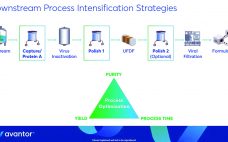Presented by:Â Gregory Bleck, PhD, vice president, Catalent Biologics Speed and efficiency remain major drivers for developers bringing their protein-based biologics to first-in-human studies. The right cell-line development approach can help streamline a path to clinic for both standard monoclonal antibodies and more complex modalities such as bispecifics. Bleck shared recent data on how the GPEx suite of technologies provides for high titers, short timelines, and flexibility in cell-line development for mammalian-expressed proteins. He began by explaining that protein therapeutics can…
BPI Theater @ BIO 2021
A Multifunctional Single-Use Purification System for Connected and Integrated Continuous Processing
Presented by: Charles Heise, PhD, senior staff scientist, bioprocessing and development, Fujifilm Diosynth Biotechnologies Heise focused his presentation on the SymphonX single-use purification system and its role in continuous bioprocessing for the downstream processing of monoclonal antibodies (MAbs). He described how the system enhances the company’s MaruX continuous purification platform. The company sought to meet the requirements of both batch and continuous processing, for which the single-use approach requires different flow paths, presents complex process integration across diverse vendor systems,…
Embrace Molecule Complexity with Optimized Expression Technologies
Presented by: Anil Sebastian, group leader, cell culture development; and Joachim Klein, head of microbial strain development and cell banking, Lonza Pharma & Biotech Although monoclonal antibodies (MAbs) remain the most popular modality in the biopharmaceutical industry, new molecular formats (NMFs) such as multitoxin antibody–drug conjugates and multichain antibodies are gaining ground quickly. Such molecules are imposing new demands on gene-expression technologies. Sebastian and Klein described how their company’s solutions support upstream development for therapies based on NMFs. Sebastian highlighted…
Don’t Let the Immune Response Blindside You: The Importance of Early Immunogenicity and Immunotoxicity Assessment
Presented by: Noel Smith, head of immunology, Lonza Pharma & Biotech Biopharmaceutical developers are keenly aware of high attrition during preclinical drug development stages. Immunogenicity and immunotoxicity concerns account for many program failures. Thus, developers strive to identify safety concerns as early as possible. By detecting problems early, companies can reengineer their molecules, investigate process-related solutions, or select alternative lead candidates. Smith reviewed methods that Lonza has developed to enhance early immunogenicity and immunotoxicity studies. Smith noted that several factors…
Key Challenges and Potential Solutions for Eliminating Bottlenecks and Optimizing Downstream Operations
Presented by: Willie Hesselink, technical application project manager, biopharmaceutical production, Europe, Avantor Investments in cell-culture technologies have increased monoclonal antibody (MAb) yields significantly over the past two decades. Downstream operations continue to lag in productivity, however. Hesselink explored how companies can align downstream productivity with upstream yields to mitigate production bottlenecks. He focused on intensifying chromatography steps, optimizing buffer preparation, and mitigating variations across raw materials. Chromatography resin selection is vital to downstream intensification, Hesselink explained. Capture and polishing steps…
A Behind-The-Scenes Look at Lykan Bioscience’s State-of-the-Art, Purpose-Built Cell Therapy Facility
Presented by: Patrick Lucy, president and chief executive officer, Lykan Bioscience Lykan Bioscience is a cell-therapy–focused contract development manufacturing organization (CDMO) based in Hopkinton, MA. Lucy’s presentation showcased his company’s new purpose-built manufacturing facility and described how its design can help to expedite manufacturing of cell therapy products. Emphasizing the highly individualized nature of autologous therapy production, Lucy also explained how the Lykan team integrates its logistical and manufacturing operations to maximize patient access to lifesaving treatments. Lykan’s 64,000-ft2 facility…
Comprehensive Target Discovery and Validation at HDB–WuXi AppTec
Presented by: Shelly (Fang) Zhang, director II, exploration biology team leader, HD Biosciences–WuXi AppTec Novel target discovery and validation are the most crucial steps in successful drug development. Zhang presented her company’s evolving advanced gene manipulation (AGM) program, which is propelled by application of clustered regularly interspaced short palindromic repeats (CRISPR) and CRISPR-associated protein_9 (Cas9) technologies. The AGM platform supports target discovery and validation for conventional biologics and new modalities. She highlighted a number of technologies in development and their…
TESSA Platform Delivers High-Quality, High-Titer, Multiserotype rAAV Stocks
Presented by: Maria PatrĂcio, lead scientist for viral design and discovery, Oxgene, a WuXi Advanced Therapies company Building upon colleague Jason King’s BPI Theater presentation on transient transfection platforms for viral-vector production, PatrĂcio focused on scalable manufacturing solutions for adenoassociated virus (AAV), the vector used most often to deliver gene therapies. AAV naturally requires a helper virus to replicate. Plasmid transfection enables helper-free manufacture, but that process is difficult to manage at commercial scales. A more scalable approach is to…
Applying the Allogeneic Process to Overcome Challenges in Cell Therapy
Presented by: Evan Zynda, staff scientist, Thermo Fisher Scientific Cell therapy companies increasingly are pursuing allogeneic therapies to negotiate manufacturing challenges associated with autologous approaches. Products based on high-quality cells from healthy donors could improve therapeutic efficacy. Allogeneic approaches also could facilitate large-scale therapy production, which in turn could reduce time-to-treatment and increase therapy affordability and accessibility. Zynda showed how increased understanding of T-cell biology could help improve allogeneic workflows. Zynda emphasized the utility of studying signaling pathways associated with…
Transient Viral Vector Solution
Presented by: Jason King, business development manager, Oxgene, a WuXi Advanced Therapies company Since joining the WuXi Advanced Therapies division of WuXi AppTec in March 2021, Oxgene has focused on helping gene therapy developers to optimize their viralvector production systems as they transition from preclinical and early clinical projects to good manufacturing practice (GMP)-grade manufacturing. King observed that early stages of gene therapy development nearly always involve systems for transient transfection rather than scalable platforms. Inducible producer cell lines, viral…










